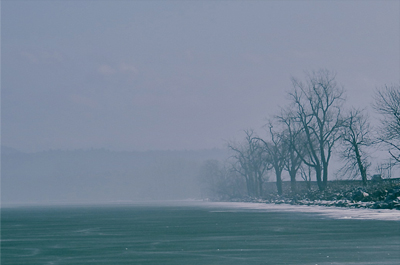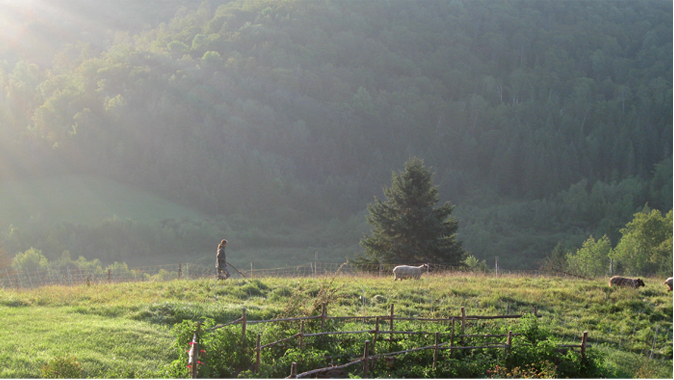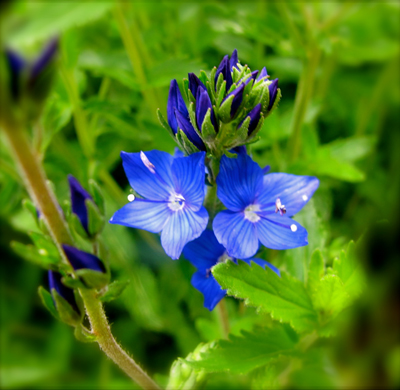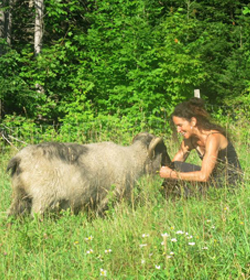December 2015, Issue #3
EXTINCTION/DEVOTION
TABLE OF CONTENTS
Editorial
Lise Weil
 Kristin Flyntz
Kristin Flyntz
I. EXTINCTION
Debra Magpie Earling
From The Lost Journals of Sacajewea
Melissa Kwasny
After•Word from Ghost Dance: the Poetics of Loss (Debra Magpie Earling)
Naeemeh Naeemaei
Dreams before Extinction
Deena Metzger
Our Radiant Lives
Mary Sutton
Her Body is Burning
Naomi Shihab Nye
My Grandmother Said
 Netanyahu
Netanyahu
Lena Khalaf Tuffaha
Arrest
Sara Wright
Tree Holocaust
Beverly Naidus
Curtain Call: Portable Altars for Grief and Gratitude
Marilyn DuHamel
Turning Point
Susan Cerulean
Bear Requiem
Margo Berdeshevsky
Our Safe Word
II. DEVOTION
Mei Mei Sanford
Serach Bat Asher Speaks
Lise Weil
First, a Mother: Interview with Megan Hollingsworth of
ex•tinc•tion wit•ness
Caroline Casey
Beauty from Brokenness: Interview with Lily Yeh
Sharon English
After•Word Our Call to Indigenous Consciousness: Taiaiake Alfred’s Wasáse
Cynthia Anderson
From the Beginning
 Nova
Nova
Anne Bergeron
Calling out the Names
Julie Gabrielli
Song of the Chesapeake
Nora Jamieson
I am Nothing without my Dead
Patricia Reis
After•Word Nora Jamieson’s Deranged
Rebecca Brams
The Bone in My Yard: a Story-Carrier’s Path
Lise Weil
Listening to Natural Law: Interview with Ayya Santacitta
Courtney Cable
After•Word Kenny Ausubel’s Dreaming the Future
Cynthia Travis
Offerings
Anne Bergeron
Calling out the Names
Journey
Four years ago, in the midst of monsoon season in South India, my husband and I were homesick and cold. The rains had knocked out power days earlier, and one interior wall of the house was crumbling into a heap of stones. In the kitchen, a thick, golden sambar soup flavored with pungent mustard seeds, fresh curry leaves, and grated turmeric simmered atop the propane hotplate. Each night as rain slammed into the windows, we huddled by the light of the open fireplace, sipped the sambar, and felt warm, safe, and happy. The arrival of the intense rains was good news, but this downpour had begun several weeks later than usual, and that worried the farmers who depend on rainwater brought by the Northwest monsoon for planting rice and other crops. What no one knew then was that the rains would remain erratic for four consecutive years, interrupting rice planting and harvesting, drying up groves of drought-resistant coconut palm trees, and sparking fears of shortages in drinking water. The biannual heavy rains that take down power lines and wash out roads mean survival for every person, animal, and plant who call the Western Ghats home.
Glynn and I had been working for an NGO in Tamil Nadu in the fall of 2011, and the return to our home in rural Vermont coincided with the Winter Solstice. Eager to reunite with our friends and to share the spicy soup that had kept us warm during the rains in India, we cooked up a sambar on the first night of winter and welcomed the return of the light with forty neighbors and friends by the warmth of a roaring fire on our hilltop. In late summer, Glynn and I had been reluctant to leave our land and the home we had built together to work in India. However, that work, which focused on the health of young children of subsistence farmers, gave us a deep awareness of how the changing climate was affecting food production in a country of a billion people, as well as our own food production in backyard gardens in Vermont. More than a decade of hit-or-miss snow and rainfall in Vermont had brought us growing conditions that were too wet or too dry, as well as seasons of blight to some of our crops, and, with each spring, growing worries that this would be the year that our well would dry up.
On that snowy December night, as I stood by the fire listening to my friends speak aloud their hopes for greater peace in the world, I did not know what I would say. I had moved to this land to grow my own food and live a life close to the earth, but what exactly did this mean in the context of a changing climate and the sixth greatest extinction? How could a lifestyle choice — or hope — be enough? What came to me by the fire was the understanding that I owed the worldwide water crisis, the shriveled coconut palm, the blighted fields of potatoes, something more. When my turn to speak came around, I heard myself say something about wanting more peace in the world. But inwardly, I felt a new and different statement forming. On the brink of this new year, I realized I wanted to give the collective survival of the earth my voice.
* * *
The Ainu, who are native to Japan, have a word, “iworu,” which means their territory or range, their biome.1 “Iworu” has specific land mass denotations — the deep forest over the rise, the salty bay full of salmon, the high, pointy mountain. As is true of most original cultures, the Ainu invest their geography with spirits. There is a pulse in the forest, a cry in the winter field, a song in the mountain.
Language belongs not only to humans, but to animals and spirits, to all things wild. Ancient cultures, whether in the depths of the Indonesian jungle or the high arid desert of the American West, felt a natural desire to sing, chant, call out the names of the places that held their stories, as an answer to the hawk's cry and the wolf's howl, as an expression of gratitude for how the land gives us our lives. Story and place were one, and that symbiosis meant survival.
Survival was catalogued in the beauty of hearing the names of places spoken aloud.
* * *
 Lake Champlain, South Hero Causeway in Late Winter
Lake Champlain, South Hero Causeway in Late Winter
I have long been nostalgic for a home I never had, a feeling that my family, who provided me a very good home on the shoreline of Lake Champlain, surrounded by the Adirondack and Green Mountains, has found difficult to understand. As a teenager, I felt generations of family bonds splintering at the same time that I witnessed the wild spaces around me diminishing. I felt the ache of being someone who, by following my heart’s desire to leave home and explore the world, knowingly participated in the twin losses of family and wilderness. My brothers, my cousins and I were the first generation that was not planning to live in the town where we grew up, even though it meant discontinuing the legacy of three generations of family stories held in the memory of our neighborhood by the lake. My family never traveled; we have no stories for journeying. And here I was in their midst, needing to experience life beyond the family, beyond their chosen place. For over a decade, that desire would take me on airplanes, boats, and trains to Canada, Europe, Central America, and Asia, as well as on numerous car trips criss-crossing the United States. To compound matters, I would expend finite natural resources to take myself where I wanted to go. The strength of my desire left me no choice. I had to leave. I had to explore. As a young woman, all I knew was that it hurt to want what I wanted.
I have curled myself around that ache, hidden it like a family secret, wrapped it with a silk cloth of protectiveness. I am surprised now to find beauty in the language of its cry. In what appears to me a not-entirely-even trade with the wilderness, my husband and I have swapped our meager savings for 47 acres of forest land and wild animal habitat high in the hills of eastern Vermont to try to learn something of the language of one place before we die. In memories of our early days here, I find the beginnings of an understanding of our “iworu,” and in these memories the beginnings of a language we will spend the rest of our lives learning.
Intimacy
My husband Glynn and I walk our land with a local forester. Glynn carries loppers, I carry a scythe that belonged to my grandmother; Marcus carries a slide and a clipboard that holds a topographical map. His pocket holds a GPS. We are placing a conservation easement on our property to prevent development in perpetuity, and the state of Vermont requires that we submit a management plan in order to conserve the forest.
On this walk we identify beaked hazelnut, hay- scented fern. I find a clump of maidenhair fern, and Marcus points out evidence of beech bark disease and spruce rot, the latter an illness that takes mature spruce trees by hollowing their cores from the roots upward. Nothing to be done about it, he says. It will be fine to cut the trees where the rot has not spread too much and mill them as lumber for the house we plan to build. A few years after this walk, we nail white spruce boards milled from those trees into diagonal sheathing as early snows fall on us. Those trees now surround us daily, keeping us warm when the winter winds barrel across the meadow.
As we walk our woods in the peak of autumn foliage, the overcast sky has the sheen of pearls which illumines the sugar maples from within, their reds a contrast to green beech and birch leaves. The wind picks up as we descend toward the far boundary of our land into a conifer forest. We find fresh moose scat, and shortly after, flattened, mossy ground where the moose bedded down. In the wet earth of the vernal pool, black as raven feathers and muck dry, we find evidence of the bear who has been digging trout lily bulbs.
The moose browses on native buckthorn and maple saplings, the bear digs bulbs and forages wild raspberry in summer, the coyote yips and laughs at night, and I walk along, trying to find my place in this forest.
The intimacy the Ainu have with their landscapes is born of feeling the direction of the prevailing winds on the skin, of knowing the subtle scent of a strong storm coming, of divining the first inklings of winter in the August air. It is knowing well the scents, sights, sounds, and textures of a place; it is understanding its intimations, feeling what the trees intuit.
Night descends and we leave the forest. Marcus will write a plan for us to review. As I move cautiously into my new habitat, I feel the whole of the place listen for what I will ask of it. I sense the deep tug of responsibility to hold up my end of the deal, to learn exactly what I have entered into with this land. I hold a promissory note of paper birch, a deed proffered by white spruce and sugar maple. What response do I offer to the blue jay's screech or the tiny saw whet owl's repeated calls for a mate? In the darkness, I feel the weight of my choice.
Roots
I cannot imagine living without a garden. The return of my favorite strain of red Russian kale or calendula or salmon runner bean provides a consistency to the chaos of summer. In the garden, all about me grows excessively — daylight, heat, grass, thunderstorms, the buzz of insects, the fulsome songs of birds. Spinach bolts, thistle and witch grass thicken between emerging heads of ruby red lettuce, and arugula reaches its prime one day, then shoots sprays of white flowers skyward the next.
Building gardens makes us feel established here; we push out gently against the forest. Transplanting bee balm, anise hyssop, Siberian iris, rhubarb, and false indigo, given to us by friends, feels like sealing our commitment with every place we've ever traveled, with every place we've called our home.
Plants root easily, but how do I root myself? I think of the Ainu and try to speak my way into rooting in this ground, to offer my attention to the conifers, the maples, the hay-scented fern, the bear, the moose, the rhubarb, the indigo.
I stand in this fledgling garden and say aloud the names of the places that hold my stories, in my territory, my iworu. The sounds I make are barely whispers, tentative. I feel self-conscious. No one is watching. Just the trees. I turn toward the white spruce and red maples and speak their names louder, hearing my voice grow stronger with each one that comes.
 Highland Place, West Corinth, Home
Highland Place, West Corinth, Home
Lake Champlain. Red Rocks.
Winooski River. Huntington Gorge.
Colchester Point. Nebraska Notch.
Mount Mansfield. Bolton Mountain. Camel's Hump.
Salmon Hole. Wild River. Mount Osceola.
Pemigewassett River. South Kinsman. Three Ponds.
Grand Isle. Keeler Bay.
Hurricane Ridge. Moonstone Beach. Highland Place.
The air around me inhales each sound, each exhalation of my breath. The forest breathes back into me as I breathe in between each word.
The air, the trees, echo back to me my life. It is like hearing my own name called lovingly. It is like hearing a eulogy for all that I have to lose.
Harvest
Saturday morning, I stand by the vegetable garden and a familiar honking directs my gaze up. It is the fourth flock of migrating Canada geese I have seen in the last two days. What tugs at me as I see them in a wavy wishbone heading south? The cycle of the year turning inward once again. I watch them leave and am thankful I have the good fortune to stay. My love is here, my gardens are here, my animals, my cabin, the whole of my life. In the oven, a pie made of wild apples bubbles over, cinnamon tea steeps on the wood stove. I measure the wealth of my days by scent and harvest, by the warmth of a fire and a hand that slips easily into mine.
 Veronica, Perennial Garden, Highland Place
Veronica, Perennial Garden, Highland Place
With the turning of the leaves, the cold settles in. The crickets are barely audible at night and the sun pulls away from our meadow by five in the afternoon. Light grows dense and golden, yellow pin cherry leaves dapple meadow grass. Still, twenty-five blue morning glories opened today and pale pink hollyhocks bloom without a hint of fading.
One year has passed since we were handed the deed to our land. Under this autumn sky, I begin to understand my youthful desire to leave family and home as a yearning to be a denizen of the planet, not a person of a specific neighborhood or even of a specific family. For the first time in many years, I have no desire to leave in fall. On the autumnal equinox, we gather friends to a potluck supper. Night falls, and we stand in a circle around the fire. As I watch the rising smoke, I promise myself to kindle the home fires in honor of the voices that speak to me in these woods and from my ancestral past. I listen to the geese and do not wonder where my next migration will be.
* * *
An Apache man once told the anthropologist Keith Basso that he repeated the names of wild places aloud simply because “they are good to say.”
They are good to say. And we need to say the names of our wild places - chant them, sing them, call to them literally - so that their sounds flow easily off our tongues, become a part of the daily language we speak. In my sleep, on my woods walks, as I drive my car to work, I practice calling to the wild places being cut, flooded, and dried up. Deep in the forest, at the edge of the lake, on the banks of a river where wild leeks grow, on the top of the bare mountain summit, saying all the names of the things I love is the beginning of breaking a deafening silence and rooting myself in my home, the earth.

Anne Bergeron is a free-lance writer who lives with her husband in an off-grid house they built together in West Corinth, Vermont. She teaches literature and yoga at the Blue Mountain Union School in Wells River, Vermont, a rural pre-K through grade 12 public school of 400 students. In 2011, she received a Rowland Foundation fellowship to promote global awareness by developing a curriculum that integrates cultural diversity and wellness throughout her school. As part of this work, she was granted a sabbatical to study and teach in Indonesia and India. That experience inspired the current aim of her writing and teaching: to cultivate the necessary sensitivity and courage in herself and others to work to reverse species and cultural extinction. Anne holds a Master of Arts in English from the University of Rhode Island and an Individualized Master of Arts in Ecological Literature from Goddard College. She tends sheep, chickens, guinea fowl, dogs, cats, and vegetable, herb, and flower gardens, and enjoys being on the land in all seasons.
Want to comment on any Issue of Dark Matter, fill out the form here.
Copyright © 2014-2021 Dark Matter: Women Witnessing - All rights reserved to individual authors and artists.
Email: Editor@DarkMatterWomenWitnessing.com
Please report any problems with this site to webmaven@DarkMatterWomenWitnessing.com
